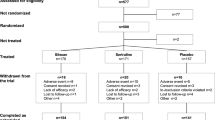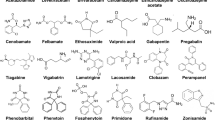Abstract
Rational
It has been suggested that phosphodiesterase 5 inhibitors such as sildenafil may be effective in the treatment of negative symptoms of schizophrenia.
Objective
This study was designed to investigate the effect of sildenafil added to risperidone as augmentation therapy in patients with chronic schizophrenia and prominent negative symptoms in a double-blind and randomized clinical trial.
Methods
Eligible participants in the study were 40 patients with chronic schizophrenia with ages ranging from 18 to 45 years. All patients were inpatients and were in the active phase of the illness and met DSM-IV-TR criteria for schizophrenia. Patients were allocated in a random fashion: 20 to risperidone (6 mg/day) plus sildenafil (75 mg/day) and 20 to risperidone (6 mg/day) plus placebo. The principal measure of outcome was Positive and Negative Syndrome Scale (PANSS).
Results
Although both protocols significantly decreased the score of the positive, negative, and general psychopathological symptoms over the trial period, the combination of risperidone and sildenafil showed a significant superiority over risperidone alone in decreasing negative symptoms and PANSS total scores over the 8-week trial (between-subjects factor; F = 4.77, df = 1; P = 0.03; F = 5.91, df = 1, P = 0.02 respectively).
Conclusion
Therapy with 75 mg/day of sildenafil was well tolerated, and no clinically important side effects were observed. The present study indicates sildenafil as a potential adjunctive treatment strategy for treatment of negative symptoms of schizophrenia. This trial is registered with the Iranian Clinical Trials Registry (IRCT1138901151556N11).



Similar content being viewed by others
References
Abbasi SH, Behpournia H, Ghoreshi A, Salehi B, Raznahan M, Rezazadeh SA, Rezaei F, Akhondzadeh S (2010) The effect of mirtazapine add on therapy to risperidone in the treatment of schizophrenia: a double-blind randomized placebo-controlled trial. Schizophr Res 116:101–106
Akhondzadeh S (1998) The glutamate hypothesis of schizophrenia. J Clin Pharm Ther 23:243–246
Akhondzadeh S (2001) The 5-HT hypothesis of schizophrenia. IDrugs 4:295–300
Akhondzadeh S (2006) Pharmacotherapy of schizophrenia: the past, present and future. Curr Drug Ther 1:1–7
Akhondzadeh S, Mohammadi MR, Amini-Nooshabadi H, Davari Ashtiani R (1999) Cyproheptadine in treatment of chronic schizophrenia: a double-blind, placebo-controlled study. J Clin Pharm Ther 24:49–42
Akhondzadeh S, Rezaei F, Larijani B, Nejatisafa AA, Kashani L, Abbasi SH (2006) Correlation between testosterone, gonadotropins and prolactin and severity of negative symptoms in male patients with chronic schizophrenia. Schizophr Res 84:405–410
Akhondzadeh S, Tabatabaee M, Amini H, Ahmadi Abhari SA, Abbasi SH, Behnam B (2007) Celecoxib as adjunctive therapy in schizophrenia: a double-blind, randomized and placebo-controlled trial. Schizophr Res 90:179–185
American Psychiatric Association (2000) Diagnostic and statistical manual of mental disorders. Fourth edition, text revision. American Psychiatric Association, Washington
Buchanan RW (2007) Persistent negative symptoms in schizophrenia: an overview. Schizophr Bull 33:1013–1022
Buckley PF, Stahl SM (2007) Pharmacological treatment of negative symptoms of schizophrenia: therapeutic opportunity or cul-de-sac? Acta Psychiatr Scand 115:93–100
Carlsson ML, Carlsson A, Nilsson M (2004) Schizophrenia: from dopamine to glutamate and back. Curr Med Chem 11:267–277
Chouinard G, Ross-Chouinard A, Annables L, Jones BD (1980) Extrapyramidal symptoms rating scale (abstract). Can J Neurol Sci 7:233
Coyle JT (2006) Glutamate and schizophrenia: beyond the dopamine hypothesis. Cell Mol Neurobiol 26:365–384
Erhart SM, Marder SR, Carpenter WT (2006) Treatment of schizophrenia negative symptoms: future prospects. Schizophr Bull 32:234–237
Goff DC, Cather C, Freudenreich O, Henderson DC, Evins AE, Culhane MA, Walsh JP (2009) A placebo-controlled study of sildenafil effects on cognition in schizophrenia. Psychopharmacol 202:411–417
Gopalakrishnan R, Jacob KS, Kuruvilla A, Vasantharaj B, John JK (2006) Sildenafil in the treatment of antipsychotic-induced erectile dysfunction: a randomized, double-blind, placebo-controlled, flexible-dose, two-way crossover trial. Am J Psychiatry 163:494–499
Kay SR, Fiszbein A, Opler LA (1987) The positive and negative syndrome scale for schizophrenia. Schizophr Bull 13:261–276
Laruelle M, Kegeles LS, Abi-Dargham A (2003) Glutamate, dopamine, and schizophrenia: from pathophysiology to treatment. Ann NY Acad Sci 1003:138–158
Mohammadi MR, Akhondzadeh S (2001) Schizophrenia: etiology and pharmacotherapy. IDrugs 4:1167–1172
Möller HJ (2004) Non-neuroleptic approaches to treating negative symptoms in schizophrenia. Eur Arch Psychiatry Clin Neurosci 254:108–116
Murphy BP, Chung YC, Park TW, McGorry PD (2006) Pharmacological treatment of primary negative symptoms in schizophrenia: a systematic review. Schizophr Res 88:5–25
Noorbala AA, Akhondzadeh S, Davari-Ashtiani R, Amini-Nooshabadi H (1999) Piracetam in the treatment of schizophrenia: implications for the glutamate hypothesis of schizophrenia. J Clin Pharm Ther 24:369–374
Reneerkens OA, Rutten K, Steinbusch HW, Blokland A, Prickaerts J (2009) Selective phosphodiesterase inhibitors: a promising target for cognition enhancement. Psychopharmacol 202:419–443
Seeman P (2009) Glutamate and dopamine components in schizophrenia. J Psychiatry Neurosci 34:143–149
Siuciak JA (2008) The role of phosphodiesterases in schizophrenia: therapeutic implications. CNS Drugs 22:983–993
Stahl SM (2007) Novel therapeutics for schizophrenia: targeting glycine modulation of NMDA glutamate receptors. CNS Spectr 12:423–427
Ueoka Y, Tomotake M, Tanaka T, Kaneda Y, Taniguchi K, Nakataki M, Numata S, Tayoshi S, Yamauchi K, Sumitani S, Ohmori T, Ueno SI, Ohmori T (2010) Quality of life and cognitive dysfunction in people with schizophrenia. Prog Neuropsychopharmacol Biol Psychiatry (in press)
Zhang HT (2010) Phosphodiesterase targets for cognitive dysfunction and schizophrenia—a New York Academy of Sciences meeting. IDrugs 13:166–168
Acknowledgment
This study was Dr. Raofeh Ghayyoumi’s postgraduate thesis toward the Iranian Board of Psychiatry.
Conflict of interest statement
We declare no conflict of interest.
Role of funding source
This study was supported by a grant from Tehran University of Medical Sciences to Prof. Shahin Akhondzadeh (grant no. 6551).
Competing interest
None.
Ethics approval
The protocol was approved by the Institutional Review Board (IRB) of Tehran University of Medical Sciences (grant no. 6651).
The trial group
Shahin Akhondzadeh was the principal investigator and provided statistical support. He was also the clinical neuropsychopharmacologist from December 2008 to May 2010. Raofeh Ghayyoumi was the resident psychiatrist and trialist from December 2008 to May 2010. Farzin Rezaei, Bahman Salehi, Azad Maroufi, and Mehrangiz Naderi were the clinical coordinators and psychiatrists from December 2008 to May 2010. Gholam-Reza Esfandiari and Fariba Ghebleh were the psychologists from December 2008 to May 2010. Amir-Hossein Modabbernia and Mina Tabrizi were the methodologists from December 2008 to May 2010.
Author information
Authors and Affiliations
Corresponding author
Rights and permissions
About this article
Cite this article
Akhondzadeh, S., Ghayyoumi, R., Rezaei, F. et al. Sildenafil adjunctive therapy to risperidone in the treatment of the negative symptoms of schizophrenia: a double-blind randomized placebo-controlled trial. Psychopharmacology 213, 809–815 (2011). https://doi.org/10.1007/s00213-010-2044-z
Received:
Accepted:
Published:
Issue Date:
DOI: https://doi.org/10.1007/s00213-010-2044-z




